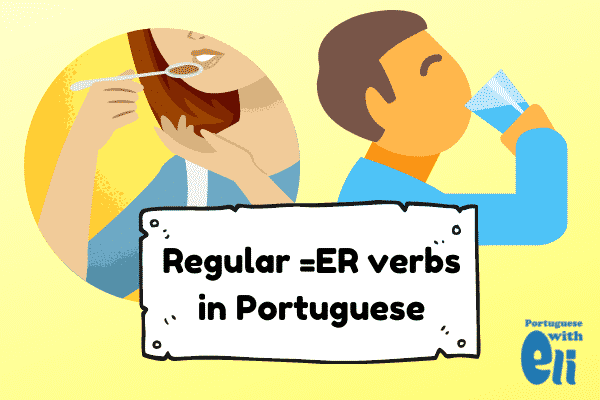ER verbs in Portuguese May Be Problematic, and Here’s Why

In talking about verbs in Portuguese, we can quote George Orwell in one of his books and say: “all verbs are equal, but some are more equal than others.”
Of course, we need to twist that a bit to fit our purposes – because, among the three main verb groups, the ER verbs in Portuguese are the least equal of all.
Why do I say so?
Well, let’s say that an inordinate number of irregular verbs make their home among the Portuguese ER verbs.
Don’t believe me? Well, check this article out about the most common Portuguese irregular verbs and see how many of them end in ER.
And since we want to make this as smooth as can be for you, we’re dealing only with the regular verbs ending in ER. Alongside some tips, you’ll learn how to confidently use them in your daily life.
The three big groups — revisited
I am always talking about the three big verb groups in Portuguese. They are the group of verbs that and in AR, ER, or IR.
There are a few verbs ending in OR (the verb pôr and its derivates), but they belong to the ER group.
Those groups receive special nomenclature in Portuguese. They are called
- Verbs of the first conjugation (AR)
- Verbs of the second conjugation (ER)
- Verbs of the third conjugation (IR)
Of those three, the most likely to give you some headaches are the verbs found in the second group. And they happen to be the topic for this article.
The present tense of ER verbs in Portuguese
The verbs that belong to this group won’t give you a headache per se — if they are regular.
I am giving you the present tense for three common verbs of this group.
| Pronoun | Comer (eat) | Beber (drink) | Viver (live) |
| eu | como | bebo | vivo |
| você, ela/ele | come | bebe | vive |
| nós | comemos | bebemos | vivemos |
| vocês, elas/eles | comem | bebem | vivem |
- Sinto muito. Eu não como carne. I’m sorry. I don’t eat meat.
- Você bebe café? Do you drink coffee?
- Eu vivo em São Paulo há 3 anos. I’ve lived in São Paulo for three years
As I said elsewhere, it is a waste of our time to include tables for every possible conjugation here. Some verbs will need more of your attention if anything because they are not so frequently used.
That’s why whenever you are in doubt you should visit https://conjugacao.com.br . It’s a website that I always recommend to my students and that I use myself.
You should visit that website, bookmark it, and revisit it whenever you have questions about how to conjugate a particular verb.
We are 👏 independent 👏 learners 👏!
But if you’re not talking about the irregular verbs here, and if the irregular verbs pose no problem, why should I care?
Because of pronunciation.
And specifically for the simple past tense, you should pay particular attention to the conjugation of the third person singular.
It ends in the diphthong EU. It’s a sound combination that doesn’t naturally exist in English — it’s a combination of the sounds “ay” as in “day” and “oo” as in boo.
But that’s just an approximation.
For more in-depth instruction, I suggest you visit our free pronunciation course on the modules dealing with vowels.
Try and practice with the recording below. In it, you’ll hear both nonstandard and correct pronunciations.
- Ele comeu e bebeu muito ontem. He ate and drank a lot yesterday.
Wrapping Up (See? Easy!)
As you can see, when it comes to the regular endings for ER verbs, there is not much to worry about.
And you see that I haven’t dealt with tenses here.
If I had, this article would have been extremely long and tiresome. Nobody wants to spend that long reading online text.
That’s why I have prepared a complete report on the verb tenses in Portuguese.
I call it the only overview you’ll need on the Portuguese verb tense system because that’s what it is.
It gives you the complete foundation to master the verb tenses in Brazilian Portuguese.
You’ll master it — not today, not tomorrow, not next week. But if you keep this manual handy and get back to it from time to time, you’ll eventually grasp the whole system and have a more confident command of it.
To download your complimentary copy, visit this page and fill in the form. You’ll receive the report directly in your email inbox.
And here’s a song that will help you remember two important verbs ending in ER in Portuguese — and a very famous children’s song from Brazil to boot. Its name is Comer Comer, and the singers are Eliana and Chiquinho (you can click here in case the video won’t open).
If you have any questions or comments, leave them in the comments section below. I always reply to comments here.





Great article–but the video does not show up! What is the name of the song?
Hello, Carolyn! The song is Comer, Comer by Eliana. If you look for it on YouTube you’ll find it for sure 🙂
I edited the article to include a direct link as well 🙂